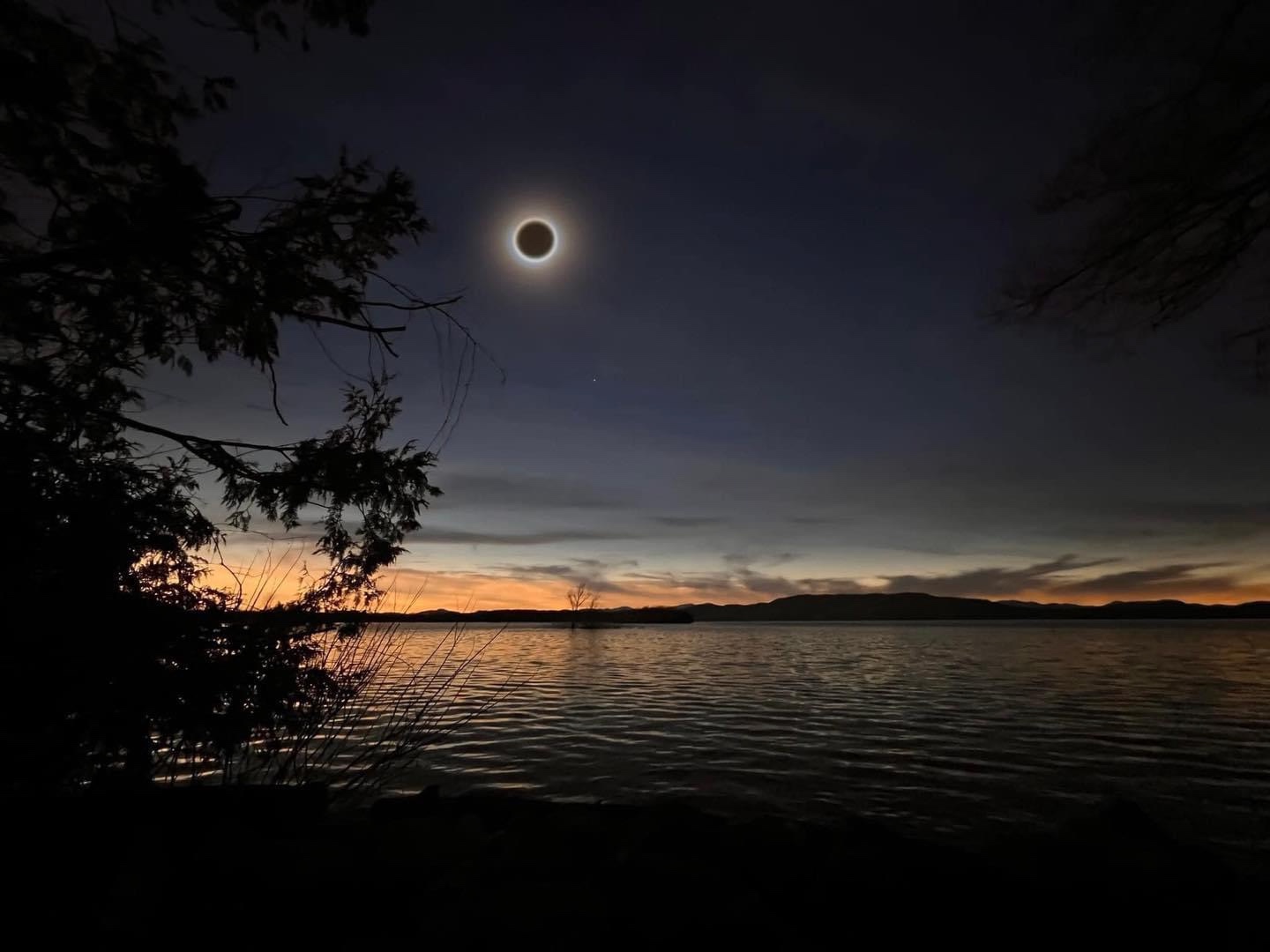A Yankee Notebook
NUMBER 2229
April 7, 2024
Eclipse!
MONTPELIER, VT – The sky has always been a source of wonder for us earthbound folks. For some of us who are – shall we say – more earthbound, it’s a source of portents, omens, and myths. What we call thunderstorms and explain as electrically charged clouds used to be thought the angry rumblings of Thor, the Thunderer. More recently, Washington Irving called it the sound of Henry Hudson’s crew playing at ninepins. When I was a kid and jumped at its crashing, I was told that if you hear it, the lightning’s missed you; that if it gets you, you won’t hear it. Very comforting.

I’ve always loved the night sky. As a northern-born creature, I’ve always had Polaris, the North Star, to lean on for direction. In my youth, the night sky was still visible – the dippers, Orion, Cassiopeia, Draco, and the planets. In Alaska once, skiing with my buddy Dudley on the Iditarod Trail, I could see the shadow of my mittened hand on the snow by the light from Venus; on a remote Texas ranch in the fifties, my old boss often ran me through the firmament when we stood in the yard just before bed (I can still hear him as he pointed toward a large orange star right at the horizon, “Now, Will, that’n yonder’s Canopus”); and one night years ago in Baxter Park in northern Maine, I turned off my truck, stepped out into utterly Stygian darkness, and for the first time in my life could see the shape of our galaxy. Like a gigantic saucer, its millions of stars stretched away above my head, and I was in it!
I don’t look up at the sky as much anymore. The night sky is paltry now, thanks to our need for security and convenience. The sky during the day still sends me some news: jet contrails that don’t evaporate quickly, for example, tell me there’s moisture up there that’ll shortly be coming down. But thanks to scoliosis, looking up is harder than it used to be. I’ve learned to identify trees by their bark instead of their leaves.
The heavens nowadays, thanks to the growing influence of science, are no longer fraught with omens and mystery. They’re fraught instead with something far more dangerous: the effects of global warming. Thunder is no longer the hammer of an angry god or the knocks of fairy-tale keglers. We’re a modern, sophisticated society, free of fanciful interpretations of natural events.
Which is why I’m startled by the folklore that sprang up regarding this week’s solar eclipse. I’m guessing it’s subsided a bit because the event has passed without any of the predicted calamities. But where, in this day and age, do they still come from?
The jet contrails are believed by many to be the work of our own evil government, seeding the clouds with chemicals designed to...well, that’s never quite clear, but it’s bad. The important part of the myth is the belief in the government’s evil intent. Perhaps not surprisingly, the fairly recent president who suggested our government was our enemy was the one whose wife consulted a celebrity astrologer for guidance.
The eclipse itself, in spite of weeks of articles, television features, and even graphics depicting its causes and course across the globe, has been considered a government operation intended to accomplish something or other nefarious. If whatever it was has happened, I haven’t noticed it, and I daresay nobody else has, either.
Strangest of all (the internet, after all, is a hotbed of conspiracy theories, and many distressed feeble minds are understandably affected) have been the placards wrapped around telephone poles declaring the return of Jesus Christ during the eclipse. Imagine how bleak your life and prospects must be to pin them both upon divine intervention for solution. Besides, this sort of craziness has happened often enough before to have become fodder for comedy. Is there some reason that history teachers can’t or don’t mention the Millerites, our own Vermont brand of end-timers?
Speaking of Vermont, anyone with internet access has seen multiple photographs of the hundreds of vehicles clogging our interstates the past few days as major chunks of our population have enacted a vast lemminglike migration north to the zone of the eclipse’s totality. Not even the leaf-peepers or ski weekenders have approached this pitch of traffic. As one Vermonter observed, “Quite a few ‘clipsers here this week.”
I wished them well. They had to fight heavy traffic and perhaps even sleep in their cars. But the eclipse itself was worth every hardship. To see the black moon creep across the face of the sun and then flame with a fiery corona – that was awesome!

